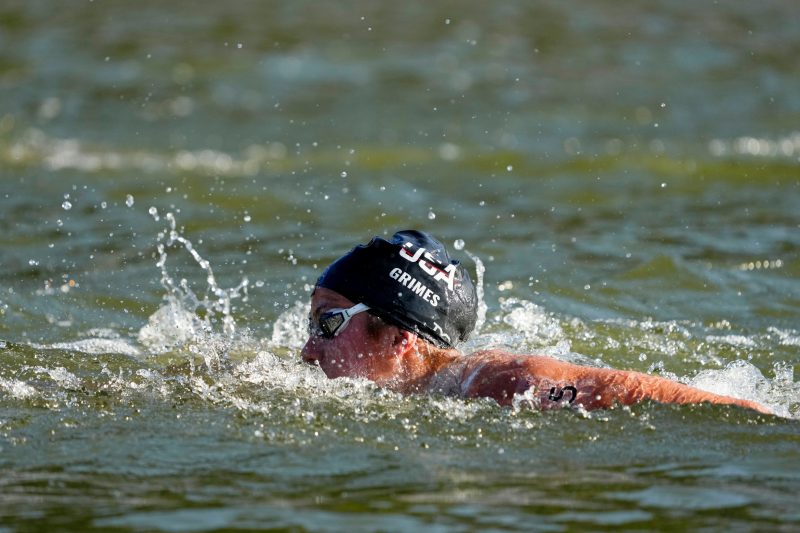PARIS — After competing in the Seine river for the women’s open water 10K at the Paris Olympics, American swimmer Katie Grimes hopes she never has to race in a river again.
Unlike a lake or ocean where open water races are usually held, the strong current created novel race conditions for the 18-year-old two-time Olympian.
“That was the hardest thing I’ve ever done, ever, I think, with just the current,” Grimes said after Thursday morning’s race. When she dove in, she became the first American woman to compete in both pool and open water swimming at the same Olympic Games.
“That’s something I’ve never done before, so that required a completely different mindset going into the race and just strategy. But it was changing the entire time I was racing.”
Grimes and fellow Team USA swimmer Mariah Denigan finished 15th and 16th, respectively, in the endurance race. Grimes’ time was 2 hours, 6 minutes and 29.6 seconds and Denigan’s was 2:06:42.9. But in open water races, placement is valued more than time because of unpredictable conditions.
2024 Olympic medals: Who is leading the medal count? Follow along as we track the medals for every sport.
Netherlands’ Sharon van Rouwendaal rallied late to win gold, while Australia’s Moesha Johnson, who led most of the race, won silver and Italy’s Ginevra Taddeucci won bronze.
“I wasn’t really happy with the place, but I’m proud of myself for how I finished it,” said Denigan, a 21-year-old first-time Olympian. “It was definitely the roughest currents that I’ve ever experienced and definitely the toughest race I’ve ever done. So it was a race of experience, and that’s what shows on the podium.”
The first of the two marathon swimming races featured 24 athletes, who completed six laps around the 1.67-kilometer loop between two Seine bridges, Pont Alexandre III, the start and finish point, and Pont de l’Alma.
While the first leg of each loop allowed swimmers to traverse with the current on the 795-meter straightaways, the back half forced them to fight against it. Olympic triathletes, who competed earlier in the Games, noted how the Seine’s strong current added extra challenges.
“It was extreme,” Grimes said about the difference going with versus against the tide.
“I think that they said the current was moving a meter per second, which doesn’t sound like a lot, but in the pool, that’s really fast. So you had to change your stroke rate completely just to keep up with it. I think it took twice as long to come back up as it did going down.”
Grimes and Denigan agreed that having more time training in the Seine would have helped prepare them better for the current and other conditions.
But Tuesday’s training session was canceled because of questionable water quality and fluctuating bacteria levels — an ongoing issue with the river, especially with E. coli levels, despite Olympics organizers’ $1.5 billion effort to clean it for the Games. Previously, swimming in the Seine had been banned since 1923.
Wednesday’s training session, Grimes said, was limited because they “didn’t really want to spend too much time here risking getting sick before the race.” At least one triathlete, Belgium’s Claire Michel, fell ill after competing in the Seine.
“I honestly didn’t think about the water quality that entire time I was in there,” Grimes said. “It’s just the last thing that was on my mind. I did swallow a lot of water, so I’m hoping that I’m OK.”
Earlier at her second Olympics, Grimes won a silver medal in the women’s 400-meter individual medley and finished 10th in the 1,500 freestyle at Paris La Défense Arena before taking on the Seine. At the 2021 Tokyo Games, she competed only in the 800 freestyle, finishing fourth.
The men’s open water 10K is set for Friday at 1:30 a.m. ET.

